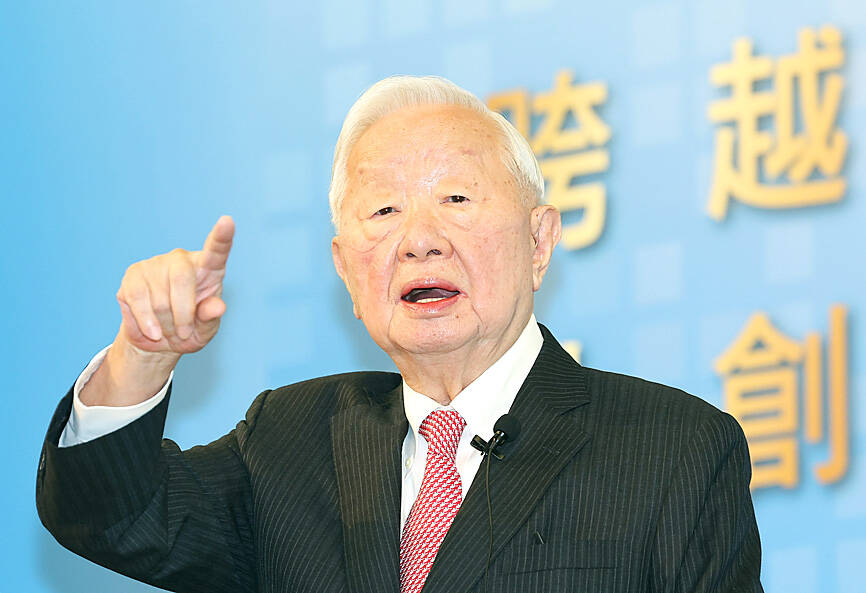Taiwan Semiconductor Manufacturing Co (TSMC, 台積電) founder Morris Chang (張忠謀) yesterday said that national security concerns and economic competitiveness have smothered globalization as the US-China trade dispute pans out.
Chang made the remark during a speech on globalization at the Taipei-based Chinese National Association of Industry and Commerce.
“The world has redefined globalization as allowing domestic companies to make profits abroad, and allowing foreign industries and services to enter the home country without harming its national security and [its] current or future technological and economic leadership,” Chang said, asking the audience if globalization can stay alive under the circumstances.

Photo: CNA
The 91-year-old industry veteran had earlier pronounced globalization “dead” amid the US-China technology competition.
Chang defined globalization as a period when countries endeavored to pursue profit and undertook commercial risks, regardless of borders.
Experts and academics at the time viewed the world as “flat” and the trend reached the optimal state in 2010, still far from the peak, Chang said.
Globalization had positive influences — such as lifting billions of people out of poverty and improving the average standard of living in almost every country, Chang said.
However, it also had negative effects, such as worsening the imbalanced distribution of wealth, he said.
Decades ago, a CEO at his former employer Texas Instruments could receive US$16 million upon retirement, but today CEOs earn more than that in a single month, widening the income gap among ranks, Chang said.
At the same time, globalization weakened the middle class in many countries by eliminating jobs, he said, adding that US steel, auto and garment makers moved their manufacturing facilities overseas, leaving many unable to share the benefits of globalization.
Globalization has led to a Thucydides trap, an apparent tendency toward war when an emerging power threatens to displace an existing great power as a regional or international hegemon, Chang said, referring to China and the US.
The US has introduced trade restrictions against China to secure its own military and economic leadership, while seeking to weaken its rivals’ competitiveness, which is at odds with globalization, he said.
Globalization is built on the foundation of the division of labor in line with comparative advantages among players who cooperate, but national security and economic and technology leadership have taken precedence over other concerns, Chang said.
That explains why the US and China have assigned more importance to competition than cooperation, he said.

Taiwan is gearing up to celebrate the New Year at events across the country, headlined by the annual countdown and Taipei 101 fireworks display at midnight. Many of the events are to be livesteamed online. See below for lineups and links: Taipei Taipei’s New Year’s Party 2026 is to begin at 7pm and run until 1am, with the theme “Sailing to the Future.” South Korean girl group KARA is headlining the concert at Taipei City Hall Plaza, with additional performances by Amber An (安心亞), Nick Chou (周湯豪), hip-hop trio Nine One One (玖壹壹), Bii (畢書盡), girl group Genblue (幻藍小熊) and more. The festivities are to

Auckland rang in 2026 with a downtown fireworks display launched from New Zealand’s tallest structure, Sky Tower, making it the first major city to greet the new year at a celebration dampened by rain, while crowds in Taipei braved the elements to watch Taipei 101’s display. South Pacific countries are the first to bid farewell to 2025. Clocks struck midnight in Auckland, with a population of 1.7 million, 18 hours before the famous ball was to drop in New York’s Times Square. The five-minute display involved 3,500 fireworks launched from the 240m Sky Tower. Smaller community events were canceled across New Zealand’s

‘IRRESPONSIBLE’: Beijing’s constant disruption of the ‘status quo’ in the Taiwan Strait has damaged peace, stability and security in the Indo-Pacific region, MOFA said The Presidential Office yesterday condemned China’s launch of another military drill around Taiwan, saying such actions are a “unilateral provocation” that destabilizes regional peace and stability. China should immediately stop the irresponsible and provocative actions, Presidential Office spokeswoman Karen Kuo (郭雅慧) said, after the Chinese People’s Liberation Army (PLA) yesterday announced the start of a new round of joint exercises around Taiwan by the army, navy and air force, which it said were approaching “from different directions.” Code-named “Justice Mission 2025,” the exercises would be conducted in the Taiwan Strait and in areas north, southwest, southeast and east of Taiwan

UNDER WAY: The contract for advanced sensor systems would be fulfilled in Florida, and is expected to be completed by June 2031, the Pentagon said Lockheed Martin has been given a contract involving foreign military sales to Taiwan to meet what Washington calls “an urgent operational need” of Taiwan’s air force, the Pentagon said on Wednesday. The contract has a ceiling value of US$328.5 million, with US$157.3 million in foreign military sales funds obligated at the time of award, the Pentagon said in a statement. “This contract provides for the procurement and delivery of 55 Infrared Search and Track Legion Enhanced Sensor Pods, processors, pod containers and processor containers required to meet the urgent operational need of the Taiwan air force,” it said. The contract’s work would be